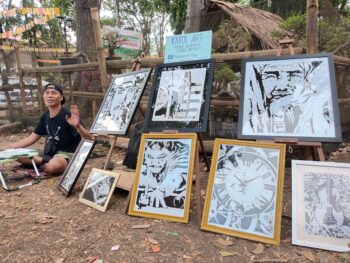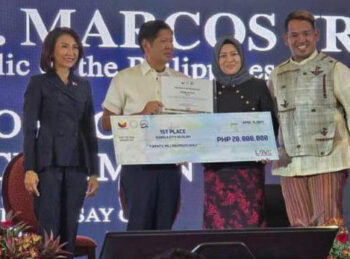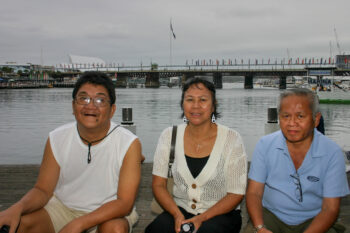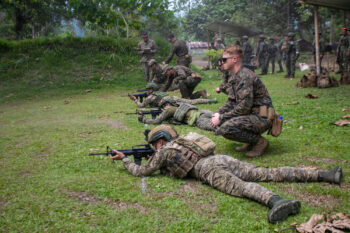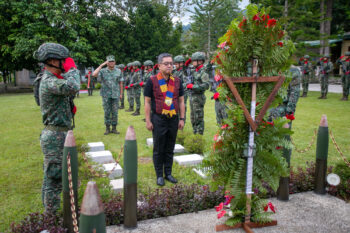DAVAO CITY (MindaNews/24 Nov) — On 1 January 2011, the Armed Forces of the Philippines (AFP) adopted the Internal Peace and Security Plan (IPSP) that seeks to transform the role of the Filipino soldiers in anticipation of a post-conflict scenario that would not require much demand on the exercise of their warfighting capability. The IPSP emphasizes the importance of military operations other than war (MOOTW) to be employed in enhancing the security of local communities.
Colonel Ricardo Jalad, commander of the 2nd Mechanized Infantry Brigade of the Philippine Army, talks about the changing role of soldiers in the environmental security of communities within his unit’s area of responsibility. The 2nd Mechanized Brigade covers Iligan City and Lanao del Norte. This interview took place on July 25, 2012 at the brigade headquarters in Maria Christina, Iligan City.
Jalad said that while soldiers would always be in a state of readiness for combat operations, the IPSP now requires it to use the non-combat approach to address security concerns. These military operations other than war (MOOTW) take off from the notion that security would be addressed by all stakeholders involved, anchored on the concepts of human security and the whole-of-nation, people-centered approach.
Human security encompasses the issue of environmental security. In the case of disaster and such events, AFP units on the ground are mandated to assist the response of other agencies, especially the local government units.
For the 2nd Mechanized Infantry Brigade, the devastation wrought by Typhoon Sendong last year became the test of its operation based on the IPSP framework. It became very much involved from the rescue phase, to the search for dead bodies, and on up to the rehabilitation phase when it took part in putting up temporary shelters and relocation houses. As disaster response, the brigade assisted in delivering relief goods to various areas affected by the flood. Later, in cooperation with the Lanao del Norte LGU, the 2MEB was able to construct two buildings, with a total of 23 units.
Typhoon Sendong was the first climate-related disaster on that scale to hit Iligan City and Lanao del Norte in years. In the previous year, however, the soldiers were already actively involved in the efforts of the LGUs to constitute and operate their respective Disaster Risk Reduction and Management Council (DRRMC). Sendong would put their preparations to the test. The DRRMC spells out the inter-agency convergence required in response to disasters.
Sadly, Sendong would overwhelm the readiness of many LGUs – with the Iligan City LGU in particular – to deal with the crisis situation it brought. Thus, in their usual role as first responders in times of disaster, the soldiers still found themselves fielding much of the inter-agency arrangements that allowed for help to get to flood victims everywhere. Still, Jalad is hopeful that with a little practice, the Iligan City DRRMC structure would live up to full operationalization, thereby shifting the task of securing our local communities to the rightful duty bearers – the local government units.
Aside from participating in LGU-led workshops where lines of communication and coordination are drawn among stakeholders to disaster response, the 2MEB also has undertaken unit initiatives to improve its capability for search and rescue. While armor troops are trained to operate tanks, Jalad constituted two teams that were trained to man rubber boats for rescue missions. The rubber boats were granted by the Department of National Defense as assets that Iligan City and Lanao del Norte could use in case of future floods. The training of the squads put in charge of the rubber boats were requested of experts from the Philippine National Red Cross and the Philippine Navy. Jalad is optimistic that once his squads have been sufficiently trained, they could be tapped to train community residents in turn for disaster response.
Meanwhile, recognizing that devastating floods are largely a result of dwindling forests, the 2MEB has also committed to the national greening initiative of the government. It has established a 30,000-seedling nursery for fruit trees and hardwood varieties and involves itself in tree-growing activities. As opposed to tree planting where seedlings are just transplanted into barren mountains and watersheds, tree growing is about sustaining efforts to nurture the transplanted seedlings to life, thereby increasing the survival rate of transplanted trees.
Disaster response provides the Filipino soldier the opportunity to transform how the military establishment relates with the people. Jalad observed that,
“Because of what we did during Typhoon Sendong and its aftermath, the soldiers came to be closer to the people. There were some people in areas here who used to think of soldiers as their enemies maybe because of some experience they had. But after Sendong, it seems their mindset had changed. They are now thinking of the soldiers as their saviors because they saw how the soldiers reacted, how the soldiers helped them.”
In Iligan City which used to be disaster-free, people would usually see soldiers when they were out for combat operations. Not surprisingly, the warfighter image of the soldier was the image that superimposed itself in the memory of civilians. It was an indelible image that had shaped their perception of the Filipino soldier. However, when Typhoon Sendong happened, this was an opportunity for the soldier to take on the role of the rescuer, the savior. It happened at a time when the troops have had education on the imperatives of the IPSP. Thus, Jalad sees that the performance of his men during Sendong was partly an application already of the IPSP. It was a performance that was well-received by a grateful community. (Wayward and Fanciful is Gail Ilagan’s column for MindaViews, the opinion section of MindaNews. Ilagan teaches Social Justice, Family Sociology, Theories of Socialization and Psychology at the Ateneo de Davao University. You may send comments to gail@mindanews.com. “Send at the risk of a reply,” she says)

